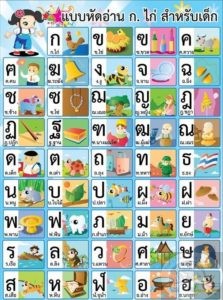Eh, What’s that they’re saying?
The beach was wonderful, and the language classes proceeded, and August turned into September, and September was coming to end. We had been promised a week off between our 4 weeks of luxuriating on the beach, and the final 2 weeks of language training in a town much closer to Bangkok, Nakorn Pathom. I must credit all the teachers for having the patience of Job and the wisdom of Solomon, for I must certainly have been a test for them; I simply clammed up and decided not to participate. I would sit and smile, all the time quietly hoping that anytime a question was going to be asked that it be asked of someone else. No matter how hard they tried, the teachers just couldn’t get me to say anything beyond the most basic one or two words that we had learned in the first few days, and of course I never forgot the word ‘Krap’. Yet something must have sunk in after all, because here I am 30 years later with near-native accentless fluency. The lessons gave me the basis for my reading skills, which helped me greatly in the years to come as I started translating Thai-language documents into English.
What to do with an alphabet of 66 letters…?
Despite all their best efforts, however, I am still not able to write very well – yes, I can write most letters, but I don’t know how to spell properly. There are 44 consonants and 22 vowels. There are three classes of letters, and several tone markers, and the combinations of these are what give definition to the words. There are 5 different letters pronounced like a ‘k’, a nearly equivalent number of ‘T’s’ a smattering of ‘C’s’ several ‘P’s’ etcetera, and yet each is used for very specific words, and for the life of me I cannot remember which is used for what. I can read the language, in context, but not necessarily single words, as words such as rice, white, mountain, they, horn, all look fairly similar and all sound quite similar, and so I cannot differentiate between them if they are shown to me one at a time. There is also the difficulty of having words with successive consonants; double ‘r’s that are pronounced as an ‘ah’ or a combination of a ‘t’ and ‘r; which are then pronounced as an ‘s’,combinations of consonants without vowels continue to throw me off, reading something as ‘phonphon’ when it should be ‘palaphon’ or ‘smao’ when it should be ‘samere’.
I maintained my stubborn silence for nearly 4 weeks, but with a shock I realized that I was about to have a week’s leave, and I would have to find my own way to the dairy cooperative – the prospect of having to find a bus, in a bus station, somewhere in some strange town was enough to spur me on to participate in a full day’s lessons. I think that in that last day before the trip I learned more Thai than I had over the previous weeks. I learned how to ask ‘where is’ ‘how do I get to’ and ‘how much?’. With those commands under my belt, I ventured to the bus station.
Bus tales
Now everybody has a bus or a train or a plane story to tell, but I bet very few have a bus story to tell of the ‘orange crush’ bus variety. The ‘orange’ due to the colour, the ‘crush’ due to the fact that there were daily notices of another one of these monsters being turned into the equivalent of a squashed soft drink can. There are 72 seats on one bus, and the seats are made for the locals. The only way I was going to get anywhere on them was to either sit on the back seat with some leg room, or stand up and stick my head out the ventilation duct in the top. There was no way I could wrap up my legs put them around my neck and sit in one of the seats. Needless to say, with room for 72 passengers seated, they somehow managed to find room for another 70 or some odd passengers to stand as well. So here you are on a crammed bus, flying down a narrow, pot-holed highway with barely enough space for two vehicles to pass by, all at about 120km an hour. The bus lurches from left to right, barely stops to let passengers off, who more or less have to jump off, or on, as the case may be, and there is some screaming idiot hanging off the handle of the back door to tell the driver to speed up or slow down or pass some guy. As the bus passes another vehicle, this same screaming idiot leans even further out of the bus and waves at the other guy to slow down and let the bus pull into the lane before it gets hit by oncoming traffic. Invariable, the passing done, the bus tries to come to a screeching halt in 50 meters at the next bus stop where a single passenger wants to get on, or off.
I think the fact that I was standing on the left hand side of the bus is what kept me from totally losing it because I couldn’t really see what was happening, but suddenly I noticed another bus next to us on the right, and one more coming from the opposite direction. Amidst a lot of blaring horns, the drivers of all three buses were smiling gleefully and waving at each other, while the occupants were all saying their last prayers, and the three idiots hanging out of the back doors of the buses were busy swapping traffic information. Somehow the moment passed and we didn’t end being turned into a soft drink can, but I was glad a bottle of Mekhong was waiting for me at the other end. I actually felt fairly confident of my language skills after I arrived at the cooperative, after all, I had managed to get to the bus station, find the right bus, and indicate the place where I wanted to be dropped off, so I was doing well. Right. It took me three years to become semi-fluent, and two more after that to lose my regional dialect and learn enough vocabulary about other subjects so that I could participate in more interesting discussions, such as those about politics and religion. What truly saved me during my first year at the cooperative were the other two volunteers living in the same house who had already been there for a year or two, and when the conversations just ran on and I got lost, it was to them I would invariable turn and ask “Eh, What’s that they’re saying?”



